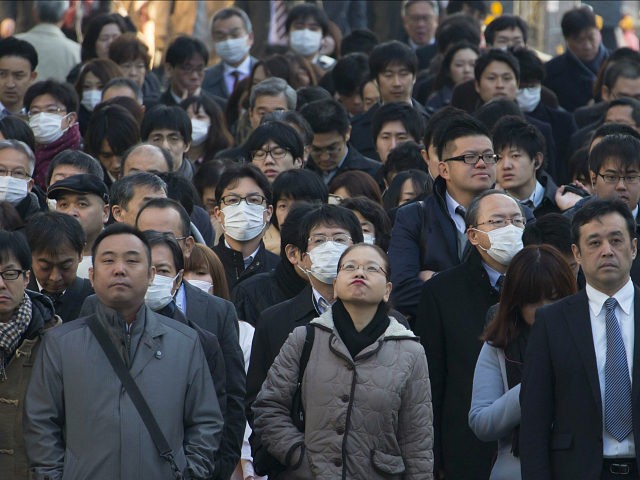A Japanese Health Ministry survey released this week found that nearly one out of four citizens has considered suicide, with more women admitting to the impulse than men but higher suicide rates among men than women.
A plurality of those who admitted to considering ending their lives said they changed their mind by focusing on work or “hobbies.”
Kyodo News reports that 23.6 percent of total respondents admitted to considering suicide – 25.6 percent of women and 21.4 percent of men. The highest number of those saying they had considered suicide were in their 50s, a whopping 30.1 percent. Individuals over 70 were least likely to admit to considering suicide at 19.1 percent.
“Asked how they were able to overcome their suicidal thoughts in a multiple-answer question, 36.7 percent said they shifted their focuses to hobbies or work, while 32.1 percent said they confided in family members, friends or co-workers,” Kyodo reported.
Japan has one of the highest suicide rates in the world, as well as one of the highest life expectancy rates and a notoriously low rate of childbirth. The statistics predict a demographic collapse, particularly in light of the government’s strict limits on immigration. The Japanese government estimates that the national population will drop by 20 million – from 100 million to 80 million – between today and 2065.
A March study by the University of Pennsylvania’s Wharton School notes that Japan has the third-highest male suicide rate among nations in the Organisation for Economic Co-operation and Development (OECD) and that men are more likely to commit suicide than women, even as more women admit to having had suicidal thoughts. Suicide brought down the national life expectancy at birth of men by 435.7 days on average, compared to 247.7 days among women.
The Wharton study cites “adverse economic conditions, unemployment, changing family structures, depression, inadequate access and resistance to mental health care, and substance abuse” as the main reasons for such a high suicide rate in both Japan and South Korea. “Clearly, this is a major public health epidemic, which has a high impact on quality of life,” the Wharton researchers warn.
Adverse economic conditions and unfavorable work culture have long plagued Japan, not only triggering depression and an epidemic of a condition commonly known as karoshi, or death from overwork, but significantly impacting the nation’s birth rate. Japanese officials have attempted to normalize time away from work through initiatives such as “Premium Friday,” in which government officials have encouraged firms to let employees leave work early on the last Friday of the month. Prime Minister Shinzo Abe himself has participated in the initiative, leaving work to practice Zen meditation.
Getting employees out of the office earlier once a month has not appeared to do much to change the culture in the workplace, in particular antagonism against women who are or may become mothers. A 2015 poll found that one out of every five young mothers with jobs outside the home said they had been harassed for being mothers. Many women find their coworkers resent them for leaving the office to care for their children and experience pressure to get abortions in order to continue working outside the home.
Many women with careers are opting to avoid romantic relationships entirely, and men are following them. The Japan Times published a survey in September that found that, among Japanese citizens age 18 to 34, “almost 70 percent of unmarried men and 60 percent of unmarried women are not in a relationship.” Among those, nearly half of women and 42 percent of men said they were virgins. “Celibacy syndrome” is a legitimate concern discussed by government officials, who see the nation’s low birthrate as a political and economic threat.
While some politicians have encouraged loosening immigration restrictions to counter the fall in population, the nation has largely not embraced this solution.

COMMENTS
Please let us know if you're having issues with commenting.